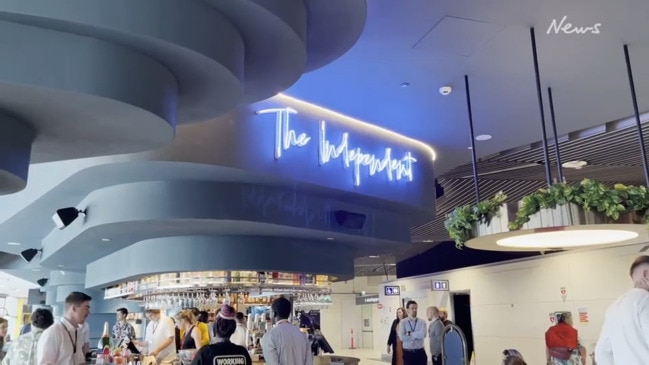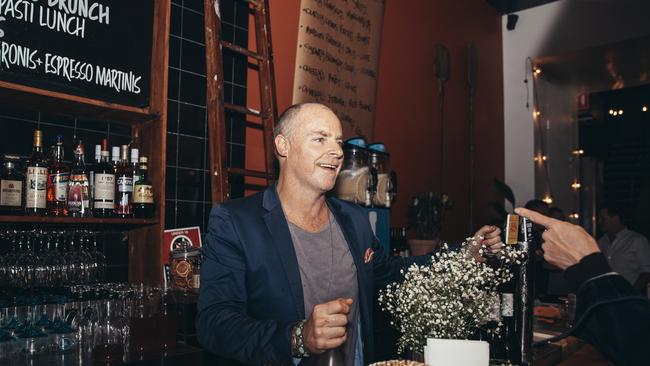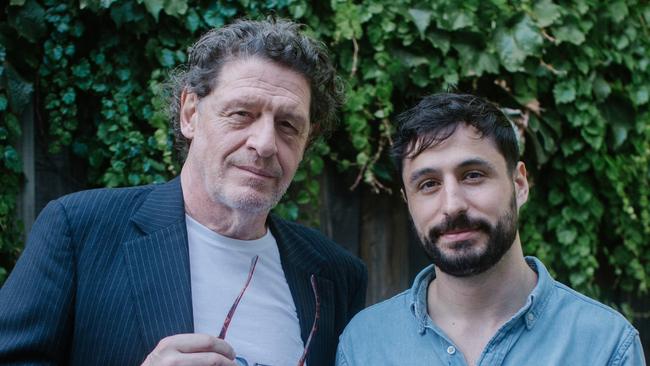Technology is changing our dining habits, restaurants couldn’t be happier
A local app is changing the times Australians eat dinner — in exchange for as much as 50 per cent off a bill.

Technology is changing the eating habits of Australian diners, shifting the times at which they visit restaurants and how much they order.
But, it’s not only being done in the way of health tracking devices or apps, which tell people what to eat or to log their food.
Rather, restaurants are having a say in the matter, with some confident they can now fill an empty restaurant within an hour on a quiet night after using the tech.
Cheeky’s Pizza + Bar in the trendy inner Sydney suburb of Darlinghurst is one of them, which now uses a dynamic pricing model to lure diners in on an empty night or at off-peak times to boost revenue and create atmosphere.
The restaurant, which is owned by Tristan Hope, behind former pizza franchise Mad Pizza, boasts a menu of 12 pizzas, including ‘the Karen’, served with vegan sausage, capsicum and black olives, and ‘don’t tell Nonna’, served with honey ham, pineapple, mozzarella and rosemary.
On a quiet Friday last week, Mr Hope said he was able to fill almost 30 extra seats after sending out a deal on the app EatClub. “That’ll be a couple of grand of a night time,” he told The Australian.
“I just went onto the app and saw our available options and offers. I bumped my offers and people reacted to that within an hour.”

EatClub, which was founded by Adelaide barman Pan Koutlakis, exists within the fintech and hospitality space, with more than 2500 local restaurants on its platform.
The start-up’s major product is a digitised dynamic pricing feature which allows restaurants to send out deals requiring diners to enter a venue before a specific time, in exchange for as much as 50 per cent off their bill.
The start-up hasn’t reinvented the wheel, but it’s taken the concept of cafes having $3 coffee between 2pm and 3pm on a Tuesday or pubs and bars offering cheaper beer and wine as early as 11am, and digitised it.
Last year it was able to raise $2.5m for the idea from Sydney firm Equity Venture Partners (EVP) and investment fund ALIUM Capital.
The company’s data now showed the deals were changing the most popular time to dine for many of its users, with about 22 per cent of its users now dining between 5pm and 6pm.
About 19 per cent of customers were dining earlier again between 4pm and 5pm while 17 per cent dined between 8pm and 9pm, and 12 per cent dined at the most popular dinner time of between 6pm and 7pm.
It was able to fill 200,000 seats which would otherwise have gone empty in June, Mr Koutalkis said.
When Mr Hope first heard of EatClub, he wasn’t impressed. “For me, in the past, EatClub was a bit of a swear word. I sort of thought that it wasn’t worth the investment or the time or the energy,” he said.
But, after meeting one of the company’s reps, his view changed and he decided to give it a shot.
“It’s been a real pleasant surprise to tell you the truth. The biggest surprise I’ve found is that if you’ve got a discount, I sort of thought it would only bring in bottomfeeders,” he said.
“What we’ve experienced is that the customers that come through with $100 to spend, even though we’re giving them 40 per cent off, they’re still spending that $100. If anything, they are spending more because they’re wanting extras and they’re ordering cocktails.”

The average EatClub spend across all customers in June was $124.56.
Mr Hope said the service wasn’t being used by those who needed the discounts most, rather it was foodies and those a little more well off.
“They’re ordering all the premium line items, they’re being inquisitive and they’re asking about the wines from different regions and the cocktails,” he said.
Part of the reason might come down to the way the start-up processes its discounts, Mr Koutalakis said.
The start-up rolled out a digital MasterCard which can be added to an Apple or Google wallet and automatically discounts the bill at checkout, with no input needed from the customer.
“They go to the restaurant completely anonymously like any other customer. They tap to pay and the offer automatically gets applied for them in the background,” Mr Koutalakis said.
“It’s a true reinvention of the voucher or the coupon, and when I say reinvention, it makes the voucher or the coupon obsolete — it’s the same system just without any operational burden.”
Removing the hassle or shame associated with the use of discount coupons was better for both the customer and the worker taking payment, he said.

Mr Koutlakis said he believed EatClub was slowly changing the view of hospitality venues which once counted any discount or loss as a direct loss.
“The idea that some people think If you give a discount you’re losing money on that table is really not built in reality,” he said.
“All of our founders have been involved in hospitality businesses where it was important to drive demand, even if you had to forgo something to drive that demand at particular times to make more money overall through the week.”
At Cheeky’s, Mr Hope said, while he loved having a full restaurant, giving them away at a discount meant he had to manage labour and other costs more carefully.
“If you’re giving away 30 to 40 per cent off the bill, it doesn’t leave much fat for things like labour. We’ve got to continue running on our existing labour levels for this to work,” he said.
“So it does put a little bit of pressure on the team, but you’ve just got to manage that effectively in it.”
EatClub is gearing up for an international expansion with eyes set on the UK, Mr Koutlakis said. But, before then, it has its eyes on Canberra, which it hopes would be the eighth Australian city it enters after launching in Melbourne, Brisbane, Adelaide, Gold Coast, Sunshine Coast, Perth and Sydney.






To join the conversation, please log in. Don't have an account? Register
Join the conversation, you are commenting as Logout